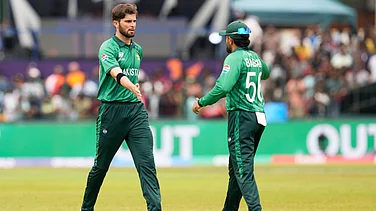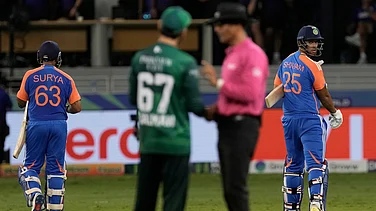THE jinx is broken: Mohammed Azharuddin and his boys have consigned every accepted perception about their team to the dustbin. That they can't muster a huge total if Sachin Tendulkar doesn't chip in with a ton. That they can't scuttle a side out if Javagal Srinath doesn't do it forthem. That they can't field. That they can't catch. That they can't beat Pakistan. Why, one lonely man in Bombay sipping his warm Heineken who threatened to play spoilsport and even once suspected the skipper's credentials while taking on our friendly neigh-bourhood rivals must be wondering if cricket isn't a great leveller.
Wasim Akram came to Bangalore because he said he had discovered 32,000 reasons not to play the quarter-final of the Wills World Cup in Pakistan, but there were 13,000 extra reasons at the Chinnaswamy Stadium he hadn't counted. As he and his men exited from the tournament on March 9, not knowing what awaited them back home, they must have drawn solace from the hoarding at St Mark's Cathedral next to the arena that hosted the Match of the Tournament: "Leave your worries to God for He cares for you."
Sentiment transgressed sport as 55,000 Indians egged on the 11 on the field, reminding the Pakistanis in poster after embarrassing poster that "this isn't Sharjah". The only shouts of " Pakistan zindabad " were on television screens relaying the Sri Lanka-England one-sider. But they were not enough. The Indians produced a winner from just out of nowhere—just like the frenzied, war paint-clad spectators produced matchboxes amid airtight security to light the victory torches—to proceed to the semi-finals in Calcutta.
It wasn't over yet, what with the Lankans waiting around the corner, but the gains of the 39-run win were obvious. If cricket is a mind game, as the pundits believe it is—a test of temperament more than talent—India beat Pakistan at it. And handsomely, too. First Ajay Duleepsinhji Jadeja—living proof that cricket can flow in the blood if it wants to—took the battle across the Line of Actual Control with a breathtaking blast against Waqar Younis, and then Venkatesh Prasad and Srinath put Saeed Anwar and Aamir Sohail's counter-attack behind them to bring the Indians back into the reckoning.
They fielded spectacularly, bowled within their limitations and gave the neighbours a taste of their own medicine to win their ticket to Calcutta. Such was the pressure that even the unflappable Javed Miandad appeared as if he was playing in his first, not sixth and final, World Cup. It was one thing for manager Intikhab Alam to tell journalists on the flight from Delhi, as his players slept blissfully, that the match was more about friendship than sport, and it was another that he was calling it the 'final' of the tournament on arrival.
To say the atmosphere was charged is an understatement. Long before the quarter-final line-up had been decided, top Bangalore police officials were privately expressing the fanciful hope that it would be a Kenya-Zimbabwe contest. But India vs Pakistan opened up a whole new set of problems and prospects underlining the Coke ad punchline: "Passion had a colour." In the event, it was light blue.
It was perhaps only appropriate that the first full-fledged encounter in nine years between the two Asian rivals, which have both won cricket's showpiece once, took place here. The Chinnaswamy Stadium is considered by international cricketers to be the best in the subcontinent. And it was here, in 1987, that one of the best displays of modern bats-manship by Sunil Manohar Gavaskar was showcased to the world against the guiles and wiles of Iqbal Qasim and Tauseef Ahmed.
But even Sunny Gavaskar was forced to concede that this was a different cup of tea. Much has happened on both sides of the border in the intervening years, and elsewhere, so much so that on Saturday the line between fan and fanatic blurred long before the first ball was bowled. It wasn't spin that was the difference between the victor and the vanquished but nerves. Pakistan blinked first.
The cause of cricketing peace may not have been helped when missiles were hurled at Salim Malik or whenever Javed Miandad was reminded by the spectators that they hadn't forgotten his monkeying around in the only previous meeting of the two teams in World Cup—in Sydney in 1992. Umpire Steve Bucknor diplomatically called on the personable Ajay Jadeja to pacify the crowd in the former case.
But as Sohail repeatedly shrugged his shoulders and got into altercations with Venkatesh Prasad as the Indians appealed at anything and everything, Ian Chappell's legendary advice to a captain who took similar umbrage came to mind: "Mate, you do the batting, we will do the appealing, and the umpires will do the umpiring."
The fact that the Indians bounced back in spite of the failure of the 1992 Man of the Match Tendulkar, and in spite of the amazing counter-attack by Sohail and Anwar, amply underlines the significance of the win. But only just. The Pakistaniblitz proved how ridiculously the rules of instant cricket are loaded against military medium bowlers and how deep the crisis of pace bowling talent is in a country which boasts more pace schools than spin ones.
India won on Saturday, but the team management can't delude itself. It was a close shave. Prasad did the trick, but the limitations of the opening attack stand seriously exposed. The team management's move to drop Manoj Prabhakar after just one bad match, knowing fully well that Prasad, otherwise a clever user of the old ball, is unaccustomed to the vagaries of the new one, shows acute myopia.
Twenty-four days after it all began, at a little past 10 pm on Saturday, Bangalore answered a question that had been posed by a poster at the venue of the first match of the tournament in Ahmedabad: "Sixth World Cup or Third World War?" As 1,800 policemen—10 deputy commissioners, three additional commissioners, 150 inspectors, 500 sub-inspectors and 1,000 head constables and constables—and 45 platoons of the State Reserve Police, five companies of the Central Reserve Police Force and the Rapid Action Force watched helplessly when the victory torches were lit, there was little doubt.
The Indians, it seemed, had followed to the last alphabet cricketer-turned-commentator Ravi Shastri's recipe for success against Pakistan: treat every single match as war. Sure, players of both teams chatted each other up in the initial stages to ease the mounting pressure. But as the Chinnaswamy Stadium fast turned into a pressure cooker and as tempers flared, the camaraderie vanished in a flash.
As power consumption dropped back to normal in power-short Bangalore, as the spectators dispersed peacefully laying to rest the police's worst fears, the question posed by the city's best known real estate agency seemed more than rhetoric: "If we can play together, why can't we live together?" Why, indeed?






















